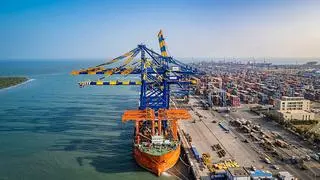Online payment gateway aggregator Razorpay has on-boarded the port community system (PCS), the cloud-based technology that seeks to integrate multiple stake holders from the maritime trade on a single platform.
Portall, a logistics management application, developed by Mumbai-based logistics conglomerate J M Baxi Group, was awarded the contract by the Indian Ports Association, an autonomous body under the shipping ministry, to roll out a pan-India Port Community System (PCS 1x).
Portall has signed up with Razorpay for facilitating payments, a shipping ministry official said adding that it will avoid dependency on bank-specific payment eco-system.
The aim is to make money transactions smooth and hassle-free for the trading community. Talks are also on with others to make the payment system convenient and fool-proof, he said.
Since its December 2018 launch at all the major ports simultaneously, the Portall PCS has seen about 14,000 users exchange more than 70,000 transactions daily, including modules related to Customs, Finance, Cargo and Transport.
The PCS is designed to handle 27 different maritime stake holder categories such as major/non-major ports, container freight stations, inland container depots, inland waterways, coastal shipping, empty yards, freight forwarders, ship chandlers, bunker suppliers, non-vessel owning common carriers, director general of light houses and light ships to help end-to-end trade transactions.
The system is cloud-based and integrates the work-flow seamlessly and hence has the least chance of data breach, thereby enabling data security which is an area of concern for the trade, the ministry official said.
The adoption of the Portall PCS would result in a marked improvement in ease of doing business. It will help in improved visibility, reduction in time and cost along with documentation work. The digital solution also aids in improving the payment facility and e-delivery in maritime trade.
This system will enable the trade to have improved communication with the Customs as they have also embarked on an Application Programming Interface (API)-based architecture, thereby facilitating real-time interaction.
The platform offers value-added services such as notification engine, workflow, mobile application, track and trace, enhanced user interface, better security features, improved inclusion, vessel details, etc. A unique feature of PCS 1x is that it can latch on to third-party software providing services to the maritime industry, thereby enabling the stakeholders to access a wide network of services.
India’s trade and logistics service providers have been grappling with multiple coordination points like Customs, shipping lines, CFSs, ICDs, port terminals, stamp duty payments and dealing with layers of documentation involved at these locations. Payments by DD/ cheque/ cash etc, often delay cargo clearance process. Absence of live updates and shipment delivery problems during holidays add to the woes.
There are some 21 government departments involved in the export-import chain some way or the other. It takes about 8-10 days for completing documentation – 7 for exports and 10 for imports - in India compared with four days in Germany. These agencies have different ways of interpreting procedures leading to litigations that takes years to be decided.
Stake holders in the export-import chain have been demanding a one-stop digital platform to facilitate cargo clearances, enabling paperless transactions without any human inter-face leading to “truthfulness of data”.







